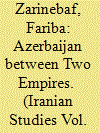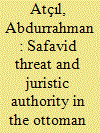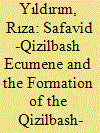|
|
|
Sort Order |
|
|
|
Items / Page
|
|
|
|
|
|
|
| Srl | Item |
| 1 |
ID:
168970


|
|
|
|
|
| Summary/Abstract |
The first part of the paper examines the evolution and transformation of Safavid ideology in the context of confessional changes and the role of Turkoman tribes in the Safavid social movement in the Ottoman‒Iranian borderland. The second part examines the impact of Ottoman‒Safavid wars and religious rivalry on the society and economy of Azerbaijan from the sixteenth to the eighteenth centuries.
|
|
|
|
|
|
|
|
|
|
|
|
|
|
|
|
| 2 |
ID:
154347


|
|
|
|
|
| Summary/Abstract |
This article investigates the opinions of three senior Ottoman jurists, Sarıgörez (d. 1522), Kemalpaşazade (d. 1534), and Ebussuud (d. 1574), on the subject of the Safavids and their supporters. Historians have treated these opinions as part of the vast polemical literature uniformly intended to justify an impending Ottoman attack against their Safavid rivals. Questioning the notion that all authors shared an undifferentiated attitude, this article underlines that, unlike most polemical literature, the opinions of these three jurists focused on the religiolegal aspects of the Safavid issue and varied and evolved in line with changing historical realities, the jurists’ divergent assessments of the Safavid threat, and their preference for different jurisprudential doctrines. Based on an analysis of the opinions, I argue that these jurists assumed a high degree of autonomy as producers and interpreters of the law and thus did not necessarily feel obliged to legitimate or excuse every imperial action.
|
|
|
|
|
|
|
|
|
|
|
|
|
|
|
|
| 3 |
ID:
168974


|
|
|
|
|
| Summary/Abstract |
Alevis, the largest religious minority of Turkey, also living in Europe and the Balkans, are distinguished from both Sunnis and Shiʿites by their latitudinarian attitude toward Islamic Law. Conceptualizing this feature as “heterodoxy,” earlier Turkish scholarship sought the roots of Alevi religiosity in Turkish traditions which traced back to Central Asia, on the one hand, and in medieval Anatolian Sufi orders such as the Yasawi, Bektashi, Qalandari, and Wafaʾi, on the other. A new line of scholarship has critiqued the earlier conceptualization of Alevis as “heterodox” as well as the assumption of Central Asian connections. In the meantime, the new scholarship too has focused on medieval Anatolian Sufi orders, especially the Bektashi and Wafaʾi, as the fountainhead of Alevi tradition. Critically engaging with both scholarships, this paper argues that it was the Safavid-Qizilbash movement in Anatolia, Azerbaijan, and Iran rather than medieval Sufi orders, that gave birth to Alevi religiosity.
|
|
|
|
|
|
|
|
|
|
|
|
|
|
|
|
|
|
|
|
|